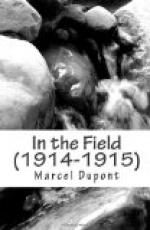“Cahard, Finet, Mouniette, Vallee, I want you.”
At a gentle trot we sallied out from the cover of the wood. My four men, dispersed at wide intervals to my right and left, stood up in their stirrups from time to time to get a better view.
The guns were silent. Now and again one or two isolated shots were heard. Night had almost fallen. On the horizon a long reddish streak of light still gave a feeble glow. Everything was becoming blurred and mysterious. In front of us stretched the disquieting mass of the wood that so lately had rained death on us. Above our heads flocks of black birds were wheeling and croaking.
“Paquin!... Paquin!... Paquin!...”
My Chasseurs shouted their comrade’s name; but no voice answered. We were certainly on the ground the squadron had ridden over. Every now and then we came across the body of a horse, marking our mournful course. A poor mare with a broken leg neighed feebly, as if appealing for help to her stable-companions.
“Paquin!... Paquin!... Paquin!...”
No response. We had to turn back and rejoin the others. War has many of those moments of pain when we have to control our feelings—forget those we love, those who are suffering, those who are dying—and think of nothing but our regiment, our squadron, our troop. Paquin’s name would be marked on the roll as “missing”—a solemn word which means so many things, a word that leaves a little hope, but gives rise to so many fears.
Over the fields, under a brilliant moon, the squadron retired in silence. Those who have served in war know that solemn moment when, after a day’s fighting, each corps arrives at its appointed place of rest. It is the moment when in normal life nature falls asleep in the peace of evening. It is the moment when in villages and farms lights appear in the lower windows, behind which the family is seated around the steaming soup-tureen after the day’s work.
It is some time now since we have tasted the exquisite peace of those moments. Instead, we have grown used to hearing over the wide country a monotonous and barbarous uproar caused by the thousands of cannon, limbers, vans, and vehicles of every kind which are the very life of an army. All these things rumble along methodically in the dark, clanking and creaking, towards a goal invisible and yet sure. Above this huge chaos voices rise in various keys: soldiers astray asking their road; van-drivers urging on their foot-sore teams; words of command given by leaders striving, in the dark, to prevent confusion among their units. This is the reverse of the shield of battle, the moment when we feel weariness of mind and body and the infinite sadness of remembering those who are no more....
Away in the distance two villages were in flames, luridly lighting up some corners of the scene. That evening seemed to me sadder and more distressing than ever....




